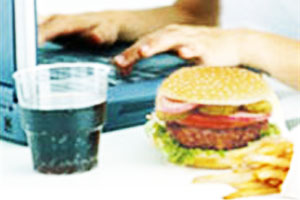 Given today's environment, it is surprising that there are still thin people around.When I was at Raging Waters water park this weekend, I was reminded yet again of the obesity epidemic in the U.S. Almost everyone there (myself included) was at the very least overweight.
Given today's environment, it is surprising that there are still thin people around.When I was at Raging Waters water park this weekend, I was reminded yet again of the obesity epidemic in the U.S. Almost everyone there (myself included) was at the very least overweight.
The origins of this epidemic are pretty easy to spot-- lots of food and less opportunity for exercise. And yet, not everyone in the U.S. is overweight. So why is one person fat and the next thin?
One big reason is genetics. A number of twin, family and adoption studies have found that somewhere between 45-60% of body mass index (BMI) comes from the genes we inherit. In other words, some people are more likely to be sucked into a Super-Sized meal because of their genes.
So how might genes affect someone’s chances of succumbing to the mountain of food now available? Lots of ways.
Some people burn energy more slowly than other people. These folks need to eat less to maintain their weight. Not an easy thing to do!
